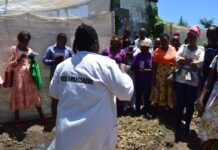By Mercy Kachenge
Nairobi, Kenya: The industry leaders from the water sectors of both Kenya and the United States gathered as Water Health Opportunity (WHO Lives) introduced its revolutionary Village Drill Hybrid. This groundbreaking technology is poised to be a game-changer in addressing the global water crisis. As Kenya strives to achieve Vision 2030 and implement the Sustainable Development Goals (SDGs), this innovation will play a crucial role in ensuring access to safe and clean water for communities worldwide.
As the Principal Secretary for the State Department of Water and Sanitation, Mr. Julius K. Korir, has outlined, the Ministry bears the responsibility of providing clean water to Kenyan citizens. This is accomplished through various agencies within the Ministry, including Water Works Development agencies. Additionally, regulatory agencies, such as the Water Resources Authority (WRA), play a crucial role in safeguarding water resources.
The PS announced that the country’s current water coverage rate stands at 72%. This signifies that approximately 72% of Kenyans enjoy access to water sources within close proximity to their homes. The ultimate goal and plan is to accelerate this access to 100% by the year 2030.
 “The plan for universal water access for everyone is that we hosted it and that is what came to a trillion Kenya shillings in that there is the normal government allocation, which has been ongoing, that accounts for about 30%” said Mr. Korir.
“The plan for universal water access for everyone is that we hosted it and that is what came to a trillion Kenya shillings in that there is the normal government allocation, which has been ongoing, that accounts for about 30%” said Mr. Korir.
Korir added that the Government had inaugurated a program encompassing several water projects, with approximately 10 projects currently in progress. Other projects are at various stages of assessment, with the aim of awarding them to private entities. The objective of this initiative is to enable the private sector to implement and distribute water to water service providers.
Mike Anderson introduced the Village Drill Hybrid, a groundbreaking technology that combines human power with the traditional village drill. This revolutionary solution has enabled the drilling of over 14,000 boreholes across 40 countries, providing clean water to more than 12 million people worldwide. Remarkably, an experienced village drill crew can drill approximately four boreholes monthly using this machine, making it a cost-effective and practical investment.
According to Mike Anderson, Director of Operations for Village Drill, several village drill crews are already operating in Kenya. These drills crews are canyon operated and have the ability to do two to three boreholes per month thus the new technology will be able to bring low cost bore holes to even extremely rural and extremely poor areas all across the country. The role of the private sector is to ensure that water coverage is accelerated in the country.
“The Village Drill Hybrid builds on the success of its predecessor, the human-powered version that was developed in 2011 which is inexpensive to purchase, simple to operate, portable, high quality US steel, durable much faster than hand digging borehole and environmental friendly since it does not use the vast amounts of diesel fuel that a big truck can use thus makes it more friendly and better for climate’’ explained Director Mike.
In addition Mike noted that the Village Drill Hybrid is not only a valuable tool for humanitarian organizations but also caters to the needs of various professionals and individuals. Entrepreneurs, farmers, ranchers, survivalists, homesteaders, water agencies, and those focused on emergency preparedness will find the Village Drill Hybrid an ideal tool.
 Moreover, WHOlives takes the initiative to equip existing drill teams with this innovative technology. Their Community-Funded Loan Program plays a crucial role in making water wells accessible through microloans. By providing subsidized wells, WHOlives empowers communities to become self-reliant, promoting sustainable water solutions.
Moreover, WHOlives takes the initiative to equip existing drill teams with this innovative technology. Their Community-Funded Loan Program plays a crucial role in making water wells accessible through microloans. By providing subsidized wells, WHOlives empowers communities to become self-reliant, promoting sustainable water solutions.
The organization is dedicated to ending the World water crisis. in Kenya as it supports the Bottom Up Economic Transformation Agenda (BETA). The project allows for low skilled employment opportunities for young men and women who have no skills since it is very easy to operate, very inexpensive to acquire and this actually gives great employment opportunities to young men and women who don’t have skills.
As stated by Mike Anderson, the initial borehole drilled using the village drill Hybrid took place in Migori. The deeper the borehole progresses, the drilling process becomes more effortless due to the increasing weight of the drill stream facilitating its advancement. However, it’s essential to acknowledge the limitations of the village drill. It is not designed to handle extreme depths or penetrate exceptionally hard rock layers.
“The village drill hybrid is going to revolutionize the way boreholes are drilled in Kenya. You can see that because of its affordability and its affordability, it does a fantastic job” he says.
According to the Kenya National Bureau of Statistics (KNBS), the unemployment rate in Kenya stands at 16.8% among the youth which is a pressing issue, particularly among unskilled young workers. It is crucial to remember that consistent employment opportunities for these individuals are essential. Many young people are struggling and seeking solutions. This tool can provide them with more than just a means to make a positive impact on their community.
“If every NGO in Kenya owned three or four village drills, they could put water at schools and health clinics and businesses. If every businessman in Kenya had a village drill, he could have a thriving business drilling borehole for his community” said the Operations Director.














